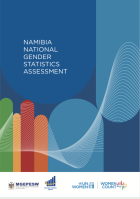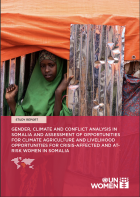1 - 20 of 20 Results
Date:
This manual has been designed for women leaders within grassroots networks throughout Somalia and in the federal member states. It will support women leaders’ capacity to engage with the Transformative Leadership for Women’s Rights principles, empowerment, peace and participation.
Date:
UN Women has been partnering and working closely with Amhara Bureau of Women, Children and Social Affairs (BoWCSA) to increase women’s effective participation and equal representation in leadership through the “Enhancing Women’s Leadership and Empowerment Project” since 2017 by employing multipronged strategies. Among the strategies, capacity development programme on Transformative Leadership for Gender Equality for women leaders coupled with mentorship support have been employed since the start of the project. So far, UN Women in collaboration with Amhara BoWCSA built the capacity of more than 1300 women leaders. It also linked 109 mentees with 109 mentors through one-to-one mentorship approach. In addition, women leaders’ networking platforms were established at regional, zonal and woreda levels to increase the voice and leadership of women leaders in Amhara region. These interventions boosted the confidence of women leaders to aspire for higher leadership positions as well as promoted gender responsiveness in their respective positions.
Date:
The Women Parliamentary Strategic Plan (2023-2027) is the result of thorough analysis of the achievements, challenges, and lessons learned from the WPC Strategic Plan (2018-2022). It reflects the expectations of the South Sudan National Legislature, constituents, and the people of South Sudan. This Strategic Plan signifies WPC’s commitment to service delivery standards for stakeholders. The WPC aims to enhance visibility by recruiting a consultant to support WPC members and on the implementation of the new SP.
Date:
This publication aims to identify the existing gender gaps in legal frameworks and policies to enable the integration of gender issues to increase the leadership roles of women and women with disabilities in local decision-making and ensure that they are equal beneficiaries of development interventions.
Date:
The main purpose of this publication is to establish baseline findings that will be used to guide the design and refinement of evidence-based project strategies and approaches to be applied in the Women’s Leadership and Economic Rights (WLER) Project.
Date:
The publication takes stock of current programme achievements, challenges, and opportunities.
Date:
29th of June 2022, the electoral law of DRC was enacted by the CENI (National Independent Electoral Commission). Article 13 paved the way for equality in Congolese politics, with new voluntary incentive mechanisms to encourage women's political participation. Nevertheless, the law differs from the practice and women continue to represent only 10% of the National Assembly.
This policy brief will offer a summary of the changes the electoral reform has brought about, and will reflect upon its evolution, achievements, and the likely challenges for the 2023 elections.
Date:
Devolution has increased opportunities for women and other marginalized groups to participate and engage in county-level planning, budgeting, and implementation, and ensured an opportunity for county governments to integrate gender-responsive mechanisms in these same processes. The report synthesizes the impact on women and girls in devolved sectors of local government including education, health, agriculture, water and sanitation, and urban planning across the 14 counties of the United Nations Joint Devolution Programme.
Date:
The identification of gender data and capacity gaps in the national statistics system is one of the first steps that has to be executed when working towards the increased production and use of gender statistics in a country. This report summarizes the findings of such an assessment done in Nambia during 2022. The findings will be used to inform planning, resource allocation and programming towards the improvement of gender statistics in the country.
Date:
Despite the gender, climatic and conflict situation in Somalia, there are opportunities to ensure crop farming and livestock rearing. Women’s participation in agricultural activities also varies depending on where they live. Women living in their regular settings were more likely to participate in agriculture compared to their counterparts who live in IDP settings. The research is aimed at promoting women's resilience to climate and enhancing livelihoods.
Date:
This brief gives an overview of the Gender Statistics programmes across East and Southern Africa.
Date:
The UN Women WCARO annual report aims to share information about the regional office's activities on women empowerment and gender equality in 2020. The said year has been a particularly difficult year around the world with the COVID-19 pandemic. In West and Central Africa (WCA), women and girls were particularly vulnerable to the crisis. To counter these burdens and build medium and long- term recovery measures, the UN Women WCA Regional Office successfully provided multi-faceted assistance...
Date:
This publication highlights findings from the Zanzibar SDGs Gender Indicators Study in the form of infographics. The infographics showcase findings from each of the sectors covered in the report namely: Poverty and Hunger, Health, Decent Work, Quality Education, Gender Equality, Key Messages and the COVID-19 Context, and Recommendations.
Date:
The IPU–UN Women “Women in politics: 2021” map presents global rankings for women in executive, government, and parliamentary positions as of 1 January 2021. The data shows all-time highs for the number of countries with women Heads of State or Heads of Government, as well as for the global share of women ministers.
Date:
Representation of a collection of marriage laws across African Member States developed in 2016 and updated in 2018 to serve as an updated compilation of Member States’ legal frameworks and legislation related to marriage. It was compiled through desk reviews of Member States’ legal frameworks, including: constitutions, civil codes, family laws and other partner documents and publications
Date:
UN Women Eastern and Southern Africa Regional newsletter of May
Date:
UN Women Eastern and Southern Africa Regional newsletter of April
Date:
The highlights of this month : Women need to play a substantive role in Extractive Industries -- Police and Prosecutors Trained to fight violence against women and girls -- IFUW Regional Seminar on Perspectives On Women’s Education for Entrepreneurship in Africa -- Sudanese women work towards a new, gender-responsive constitution
Date:
The highlights of this month : UN Women Executive Director calls for an end to harmful cultural practices against women and girls -- Male African leaders join the HeForShe campaign -- Secretary General and Deputy Secretary General of the East African Model United Nations sign up as HeForShe Champions -- Executive Director urges accelerated action to end Female Genital Mutilation ...
Date:
The highlights of this month : UN Women Malawi launches HeForShe campaign and UNiTE Creative Artist Advisory Group -- At African Union Summit, UN Women Executive Director calls for women’s full participation to accelerate peace and sustainable development -- Voices from Addis at the 24th AU Summit -- UN Women Burundi and the Independent National Electoral Commission: Mainstreaming gender throughout the electoral process ...


















